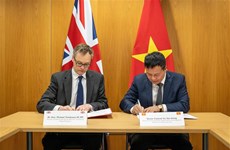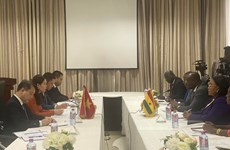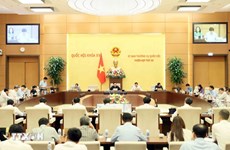Vietnamese Ambassador talks about Vietnam-US ties
Ambassador to the US talks about former Lt. William Calley’s public apology on the mass
killings in My Lai and the
level of cooperation that both countries have had.
The Vietnamese Ambassador to the US Le
Cong Phung granted an exclusive interview to the Vietnam News Agency
regarding former Lieutenant William Calley’s public apology on the mass
killings in the Vietnamese community of My Lai during the war and the
level of cooperation that both countries have had in addressing the
consequences of the war.
The interview ran as follows:
Question: The ambassador, can you comment on the first-time public apology to the victims and their families by former Lieutenant William Calley, the only US officer who was convicted in connection with the massacre of Vietnamese civilians in My Lai in 1968?
Answer: The My Lai massacre happened 41 years ago. It can be said that it is one of the most barbarous crimes the US committed to the Vietnamese people during the Vietnam War. We think that it awakened mankind and bolstered the anti-war movement which prompted the US to consider withdrawing its troops from Vietnam and accept defeat.
In my opinion, Calley’s remarks, though late, is a good deed because he talked about his remorse and his apologies to the victims, their families and Vietnam . Also, it’s not only just his own feelings. It truly reflects the thoughts of his fellow soldiers who had involved in the massacre, and also the thoughts of a majority of Americans. Therefore, I think that although it’s rather late, it’s still very good. It is another move that will help American people with a conscience perceive more clearly their responsibilities to the crimes the US committed against the Vietnamese people. And now maybe they will take more responsibility and work with Vietnam to address the consequences left over by the war.
Q: What is your evaluation of what the US has been doing together with Vietnam to address the consequences of the war?
A: Since the Vietnam war ended, the two countries have worked together a lot at multi-level forums on overcoming the consequences of the war. The US administration, the American people, schools and non-governmental organisations (NGOs) have also made significant contributions to the process. However, it can be said that what the US has done is not much and not enough.
In the capacity as a victim of the war, we have, right after the war, helped the US search for those Americans still missing in Vietnam in a humanitarian spirit. In regard of this, the US administration and the American people have highly valued the goodwill and tolerance of the Vietnamese people and the country’s leaders. On the US side, they have also cooperated with us to search for missing Vietnamese people, particularly in providing concerned documents.
They have also assisted us in clearing unexploded ordnance and bombs left over from the war and in removing Agent Orange from contaminated areas. A number of US organisations, including some led by Vietnamese people, have lent us a helping hand by providing medical treatment and assistance for people who have become handicapped by the war and those with disabilities caused by Agent Orange. There are organisations that have worked with us for almost 20 years and the US public has showed great interest in ways to address the war’s consequences.
The US administration has paid a certain level of attention to the work. US organisations have sought every means and way they could to step up bilateral cooperation, especially the US administration’s cooperation, in settling the war’s consequences.
As I said at the beginning, the US administration has done a bit, but not enough. On the other hand, they have been trying to evade responsibility for the crimes they have committed. For example, the US court rejected the lawsuit against the US producers of Agent Orange filed by the world’s political circles and organisations and Vietnam . In my opinion, the US government should make stronger moves in the future. But we should understand that if Vietnam-US ties are growing further, there will be more positive signs in the cooperation between both sides, especially in the US administration’s readiness for cooperation and support for war consequence settlement.
The US congress has reserved a certain amount of funding for the removal of toxic chemicals. And relevant departments, including the Department of Defence, the State Department and US organisations are thinking of increasing financial assistance to settle the wars consequences. I believe that Calley’s remarks and the current movement pursued by the Americans and US organisations, will make the US administration, in the near future, become more aware of their responsibilities and no longer evade the crime they have committed.
Q: What is your position on the Vietnam-US relationship at present and in the future? What are the main issues that need to be dealt with in order to strengthen relations?
A: The Vietnam-US relationship has seen positive, if not very positive developments over the recent time. Bilateral cooperation has been strengthened and increased in various areas, including security, national defence, economy, trade, investment, education and science and technology. I think that in the near future, it will continue on the right track. I’m sure the new administration of President Barack Obama will continue to increase bilateral cooperation with Vietnam .
We are preparing to celebrate the 15 th anniversary of the normalisation of relations and the establishment of diplomatic relations between the Vietnam and the US in 2010. Both countries are currently preparing for the event. We are now organising a visit to the US by the Deputy Prime Minister and Foreign Minister. Both parties are discussing a US trip by the Vietnamese Defence Minister and the US is also preparing for visits by senior officials from the US Department of State to Vietnam .
Both countries have a lot to discuss and prepare for next year, to keep the impetus of our bilateral relationship going. Firstly, we have to implement the agreements already signed between the two countries and agreements reached between Vietnamese and US leaders. Secondly, we have to further strengthen cooperation on issues of common concern, for the benefit of both parties, not only in bilateral economic, politic and education, but also on issues like climate change, anti-terrorism and regional security, especially as next year we take over ASEAN’s rotating presidency. The US has recently moved to step up relations with Southeast Asian countries, especially with ASEAN and its members. It is now even more necessary for Vietnam , when it takes the ASEAN presidency next year, to raise the level of our cooperation with the US in order to cement relations between ASEAN and the US . Therefore, the upcoming meetings between senior officers and agencies at all levels will continue to discuss how Vietnam can perform its role as ASEAN president as best as it can and how Vietnam and the US can further enhance relations between the US and ASEAN as well as the US’s links with the region.
I expect the US Secretary of State to come to Vietnam to attend ASEAN meetings and also visit the country next year when Vietnam will be ASEAN president. If the US and ASEAN reach an agreement on top-level meetings, there is the possibility that President Obama would attend the US-ASEAN summit and also visit Vietnam. Therefore, the Vietnam-US relationship has developed well and there is relatively stable foundation for it to grow. We can see that with the new Obama administration and with both sides committed, the Vietnam-US relationship will certainly improve in the future./.
The interview ran as follows:
Question: The ambassador, can you comment on the first-time public apology to the victims and their families by former Lieutenant William Calley, the only US officer who was convicted in connection with the massacre of Vietnamese civilians in My Lai in 1968?
Answer: The My Lai massacre happened 41 years ago. It can be said that it is one of the most barbarous crimes the US committed to the Vietnamese people during the Vietnam War. We think that it awakened mankind and bolstered the anti-war movement which prompted the US to consider withdrawing its troops from Vietnam and accept defeat.
In my opinion, Calley’s remarks, though late, is a good deed because he talked about his remorse and his apologies to the victims, their families and Vietnam . Also, it’s not only just his own feelings. It truly reflects the thoughts of his fellow soldiers who had involved in the massacre, and also the thoughts of a majority of Americans. Therefore, I think that although it’s rather late, it’s still very good. It is another move that will help American people with a conscience perceive more clearly their responsibilities to the crimes the US committed against the Vietnamese people. And now maybe they will take more responsibility and work with Vietnam to address the consequences left over by the war.
Q: What is your evaluation of what the US has been doing together with Vietnam to address the consequences of the war?
A: Since the Vietnam war ended, the two countries have worked together a lot at multi-level forums on overcoming the consequences of the war. The US administration, the American people, schools and non-governmental organisations (NGOs) have also made significant contributions to the process. However, it can be said that what the US has done is not much and not enough.
In the capacity as a victim of the war, we have, right after the war, helped the US search for those Americans still missing in Vietnam in a humanitarian spirit. In regard of this, the US administration and the American people have highly valued the goodwill and tolerance of the Vietnamese people and the country’s leaders. On the US side, they have also cooperated with us to search for missing Vietnamese people, particularly in providing concerned documents.
They have also assisted us in clearing unexploded ordnance and bombs left over from the war and in removing Agent Orange from contaminated areas. A number of US organisations, including some led by Vietnamese people, have lent us a helping hand by providing medical treatment and assistance for people who have become handicapped by the war and those with disabilities caused by Agent Orange. There are organisations that have worked with us for almost 20 years and the US public has showed great interest in ways to address the war’s consequences.
The US administration has paid a certain level of attention to the work. US organisations have sought every means and way they could to step up bilateral cooperation, especially the US administration’s cooperation, in settling the war’s consequences.
As I said at the beginning, the US administration has done a bit, but not enough. On the other hand, they have been trying to evade responsibility for the crimes they have committed. For example, the US court rejected the lawsuit against the US producers of Agent Orange filed by the world’s political circles and organisations and Vietnam . In my opinion, the US government should make stronger moves in the future. But we should understand that if Vietnam-US ties are growing further, there will be more positive signs in the cooperation between both sides, especially in the US administration’s readiness for cooperation and support for war consequence settlement.
The US congress has reserved a certain amount of funding for the removal of toxic chemicals. And relevant departments, including the Department of Defence, the State Department and US organisations are thinking of increasing financial assistance to settle the wars consequences. I believe that Calley’s remarks and the current movement pursued by the Americans and US organisations, will make the US administration, in the near future, become more aware of their responsibilities and no longer evade the crime they have committed.
Q: What is your position on the Vietnam-US relationship at present and in the future? What are the main issues that need to be dealt with in order to strengthen relations?
A: The Vietnam-US relationship has seen positive, if not very positive developments over the recent time. Bilateral cooperation has been strengthened and increased in various areas, including security, national defence, economy, trade, investment, education and science and technology. I think that in the near future, it will continue on the right track. I’m sure the new administration of President Barack Obama will continue to increase bilateral cooperation with Vietnam .
We are preparing to celebrate the 15 th anniversary of the normalisation of relations and the establishment of diplomatic relations between the Vietnam and the US in 2010. Both countries are currently preparing for the event. We are now organising a visit to the US by the Deputy Prime Minister and Foreign Minister. Both parties are discussing a US trip by the Vietnamese Defence Minister and the US is also preparing for visits by senior officials from the US Department of State to Vietnam .
Both countries have a lot to discuss and prepare for next year, to keep the impetus of our bilateral relationship going. Firstly, we have to implement the agreements already signed between the two countries and agreements reached between Vietnamese and US leaders. Secondly, we have to further strengthen cooperation on issues of common concern, for the benefit of both parties, not only in bilateral economic, politic and education, but also on issues like climate change, anti-terrorism and regional security, especially as next year we take over ASEAN’s rotating presidency. The US has recently moved to step up relations with Southeast Asian countries, especially with ASEAN and its members. It is now even more necessary for Vietnam , when it takes the ASEAN presidency next year, to raise the level of our cooperation with the US in order to cement relations between ASEAN and the US . Therefore, the upcoming meetings between senior officers and agencies at all levels will continue to discuss how Vietnam can perform its role as ASEAN president as best as it can and how Vietnam and the US can further enhance relations between the US and ASEAN as well as the US’s links with the region.
I expect the US Secretary of State to come to Vietnam to attend ASEAN meetings and also visit the country next year when Vietnam will be ASEAN president. If the US and ASEAN reach an agreement on top-level meetings, there is the possibility that President Obama would attend the US-ASEAN summit and also visit Vietnam. Therefore, the Vietnam-US relationship has developed well and there is relatively stable foundation for it to grow. We can see that with the new Obama administration and with both sides committed, the Vietnam-US relationship will certainly improve in the future./.













